“Gambit, Part I”
Written by Christopher Hatton and Naren Shankar
Directed by Peter Lauritson
Season 7, Episode 4
Production episode 40276-256
Original air date: October 11, 1993
Stardate: 47135.2
Captain’s Log: We open with Troi in a seedy bar, wearing civilian clothes, who says she is looking for a man who owes him money, a man who kinda matches the description of Picard (he’s mentioned as being two meters tall, which is over six-and-a-half feet, a very generous estimation of the height of a character played by the 5’9″ Sir Patrick Stewart). The bartender flirts with her for a bit, then reminds Troi that his customers prefer their privacy.
Elsewhere in the bar, Riker and Worf are also in civvies, and also questioning folks in the bar, with Worf having found a Yridian named Yranac who’s willing to talk—but only because Worf claimed that Riker’s looking for the man who impregnated Riker’s sister. Before Yranac can say anything, though, the bartender tries to throw him out. Then Crusher shows up pointing a phaser at the bartender. Riker, not missing a beat, says that Crusher is the pregnant sister in question, and she’s pissed.
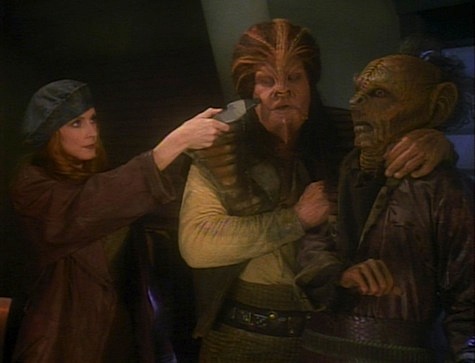
Yranac is now much more nervous, and insists that he be given passage on their ship if he is to talk, to which Riker and Worf agree. He says that the man they’re looking for was questioned by a nasty-looking bunch of aliens, who attacked him, eventually firing a weapon on him, vaporizing him instantly.
Troi, devastated, says he’s telling the truth. Crusher is able to confirm that the DNA traces in the bar are Picard’s. He’s been killed.
While Troi wants to organize a memorial service, Riker is more focused on finding out what happened. He can’t mourn until he knows why Picard died in a bar fight. The authorities on the planet where the bar was have jurisdiction, so Admiral Chekote can’t officially authorize Riker to investigate Picard’s death—but he does put the Enterprise on detached duty, so their mission is at the discretion of her commanding officer.
Riker then questions Yranac further, but he says the only other thing he remembers is that they said they’d kill anyone who talked. But Yranac is willing to risk it if Riker gives him a shuttlecraft; Riker counters with a threat of extradition to the Klingon Empire, where Yranac has a bunch of outstanding warrants for fraud. Fear of a Klingon prison does wonders to loosen his tongue: they were a band of mercenaries that have been operating in the sector for six months. They mentioned that they were going to the Barradas system. Riker has Data set a course there.
Barradas III is the only Class-M planet, currently uninhabited, though it was an outpost for the Debrune thousands of years ago. There are energy readings on the planet that indicate someone might be there. Riker leads an away team that includes Worf, La Forge, and a mess of security folks. While there are old ruins around (at least La Forge says there are—we only see rocks), there are also recent indentations that have the same microcrystalline damage Crusher found in the bar.
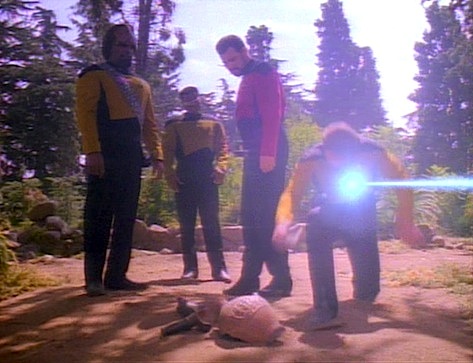
Then they’re fired upon. Some kind of interference on the surface blocks communications and transporters. The bad guys are a motley collection of aliens, including one Romulan who breaks cover to grab some pottery shards that were just dropped on the ground. Riker is knocked down by a backblast, and then the mercenaries beam away with Riker.
As soon as the mercenaries leave, the interference drops. A ship appears suddenly in orbit. It fires on the Enterprise and then goes to warp—Data goes to warp to follow at a higher speed, but the sensor signal of the ship fades away. Data goes back to Barradas III to retrieve the away team.
Later, Data briefs what’s left of the senior staff: a ship matching the configuration of the ship that fired on them has been linked to raids on planets in this sector. The Enterprise readings indicate that it’s covered in a sheath that makes it resistant to sensors, which is why they didn’t see it in orbit, nor detect it at warp.
Since they have no idea where they went, Data’s plan is to return to the surface to try to find clues as to what they were doing there. (Data then leans back in his chair with his fingertips against each other, because, y’know, that looks captainly.)
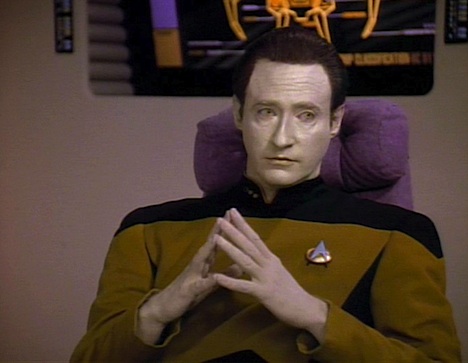
We then get a look at the mercenary ship. After Narik whines about how the engines aren’t working properly, the leader of the group, Arctus Baran, meets Riker, brought to him by the Romulan, Tallera. Riker provides name, rank, and serial number, and then says that he was on Barradas III for scientific research. When Riker gets snarky, Baran touches a control that activates a device on Riker’s neck and causes him significant pain, thus revealing how Baran controls his crew. (Everyone on board has the same small square on their necks.) Vekor and Narik both think they should get rid of Riker—Starfleet won’t negotiate for his release, but they will pursue him.
Then another of Baran’s crew pipes up, saying that Narik and Vekor are right, and that they should kill Riker now—the others call him Galen, but it is, in fact, the not-really-dead Jean-Luc Picard.
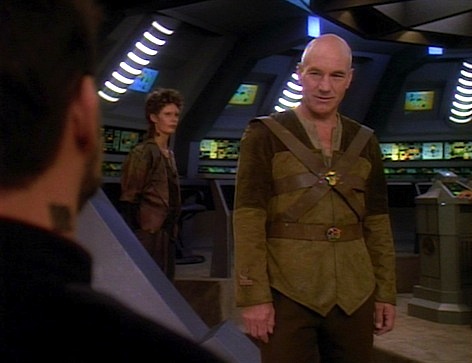
Baran thinks Riker can be useful, but “Galen” thinks he’s less useful than Baran might think, if he’s “the same Will Riker I’ve heard about.” He then goes on about Riker’s history of insubordination, even being relieved of duty at Minos Korva. Baran is suspicious of this knowledge, but he claims to have been smuggling artifacts out of Federation space for years, so he’s gotten to know some Starfleet personnel—and Riker is probably en route to a court martial. Riker plays along and snidely says he’s gotten out of them before.
Before Picard can convince Baran to kill Riker—he even volunteers to do it himself—something goes horribly wrong with the warp drive. They’re accelerating out of control. The antimatter flow regulator is malfunctioning. Picard reports this while giving Riker a look, and then Riker volunteers to fix the problem—which he does, in the nick of time. He gives Picard a smug look and asks, “Still wish you’d killed me?”
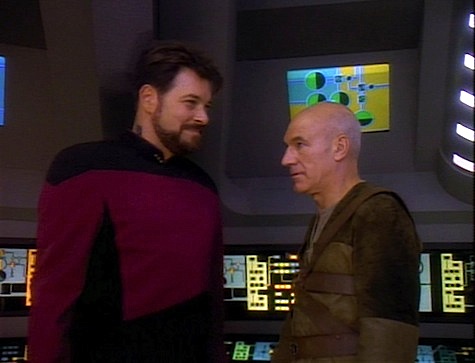
Back on Barradas III, Worf reports that the archeological digs on the planet have been looted. Data theorizes a Romulan connection—there were ruins on the planet with the bar that were Romulan in origin, and the Debrune were a Romulan offshoot. Worf also points out that the leader of the group that attacked them was Romulan. But the artifacts have no obvious value.
Of all the other planets in the sector with Romulan artifacts, there are only three the mercenaries haven’t hit. The closest is Calder II, which has a poorly defended Federation science outpost. Data warns the outpost and sets a course.
Picard meets with Riker in the quarters Baran gave him. Turns out that the mercenaries can activate their transporters via weapons fire, so Picard wasn’t vaporized, he was beamed to the ship. Picard had been on leave, studying ruins, but the site had been vandalized. Wanting to know who did it, Picard investigated, leading him to the bar. He convinced them that he was a smuggler named Galen, offering to help them appraise the artifacts. For whatever reason, Baran is collecting Romulan artifacts, and searching for a specific particle signature.
Baran doesn’t like “Galen” much, but he’s proven himself useful, so Baran puts up with him. Picard deliberately set up the engine failure, and painted Riker as a less-than-stellar officer, in order to make it easier for Riker to get close to Baran and find out the truth.
Then the door opens, and Picard immediately gets into character and backhands Riker to the deck. Baran enters and is not happy that “Galen” is performing an interrogation without his permission. Picard leaves, kicking Riker in the ribs one last time before departing.
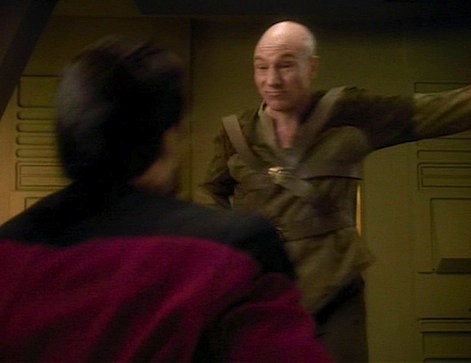
Baran announces that their next destination is Calder II. The plan is to destroy the Federation outpost in orbit, but Picard suggests using Riker to convince the outpost to lower shields so they can beam the artifacts up without any shots being fired. Tallera agrees with that suggestion, and Baran reluctantly agrees to try it.
Later, Tallera talks to Picard, wanting to know why he insists on being snotty to Baran who could so easily kill him. Picard insists that Baran needs him, as he’s increased the quality of the scans by a lot. Tallera makes it clear that she will only tolerate his attitude as long as it doesn’t get in the way of her getting her reward at the end of it all. She also makes it clear that she, at least, also knows the full story of their mission.
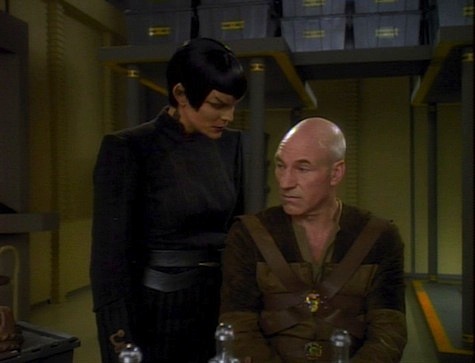
At Calder II, Riker tries to get the outpost to lower shields, but—having been warned by Data—the lieutenant in charge is stalling. Baran wants to destroy the outpost, but Picard manages to configure the disruptors to only take out the shields. Tallera beams up some of the artifacts, but the outpost restores shields before she can finish the job. Baran orders the outpost destroyed—
—but then the Enterprise swoops in. Baran instructs Riker to order the ship off, which he does. Data is reluctant to do so, given the danger to the outpost, so Riker cuts him off and then offers to use his command codes to lower the shields.
Worf, of course, detects this, and it doesn’t work because his codes were changed the minute he was captured. But Data knows that he knows this, and so figures he has his reasons for wanting the mercenaries to think he has control. He orders Worf to drop the shields, and then Baran orders Galen to fire on the Enterprise.
To be continued…
Can’t We Just Reverse the Polarity?: When the flow regulator freezes, Riker figures it’s a controlled lockout in the regulator subsystem. He runs an active bypass through the plasma flow converter, and has Narik run phase lock feedback through the regulator on a six-second delay. Afterward, he suggests they reinitiate the regulator subcompressors. Cha cha cha.
Thank You, Counselor Obvious: Troi gets to yell at Riker for being selfish and unwilling to participate in the memorial service for Picard.
If I Only Had a Brain…: Data gets two promotions in one episode, sitting on Riker’s right in Act 1 when Picard is believed killed and taking command after Riker’s captured. He has to contend with a ship that can’t be detected and a cranky Worf.
There is No Honor in Being Pummeled: Worf does well in working Yranac, finding the way to get him to talk through his affection for his own sister. He then rather tiresomely gets to play the same role Hobson played in “Redemption II,” straw malcontent for Acting Captain Data to knock down.
I Believe I Said That: “Perhaps there is an element of risk here that I did not appreciate.”
“And how much more latinum will it take to offset this risk?”
Yranac and Worf, negotiating.
Welcome Aboard: Quite the assortment of guests in this one. Veteran character actor Richard Lynch, who made a career of playing scumbuckets, plays to type as Baran. Julie Caitlin Brown (credited as Caitlin Brown) plays Vekor, having played Ty Kejada in Deep Space Nine’s “The Passenger”; these days, Brown is an actor’s agent, managing convention appearances for them. Robin Curtis returns to Trek as Tallera, having replaced Kirstie Alley in the role of Saavik for Star Trek III: The Search for Spock and Star Trek IV: The Voyage Home. Alan Altshuld once again drowns in latex as Yranac, having played a heavily made-up mercenary in “Starship Mine”; he’ll appear twice on Voyager, in “False Profits” and “Day of Honor.” Bruce Gray reprises his role of Admiral Chekote, having just played him the previous week on DS9’s “The Circle.” Stephen Lee, having played Chorgan in “The Vengeance Factor,” overenunciates as the bartender. And Cameron Thor whines a lot as Narik.
But the episode’s Robert Knepper moment is Sabrina LeBoeuf, who made a name for herself as the eldest child on The Cosby Show, as Data’s replacement at ops.
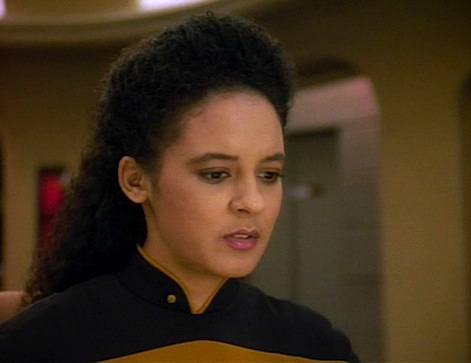
Trivial Matters: Picard cloaks a good lie with a truth—Riker was actually relieved of command at Minos Korva in “Chain of Command, Part II.” He also names his smuggler alias after his mentor in archaeology, first seen (and also killed) in “The Chase.”
This is the only mention of the Debrune on screen, though they are mentioned in the comic book Star Trek Countdown, the RPG modules The Way of D’era: The Romulan Star Empire (from Last Unicorn) and Worlds (from Decipher), and in the Haynes reference work U.S.S. Enterprise Owners’ Workshop Manual (which established that Barradas III’s ruins were first explored by the U.S.S. Enterprise-B under the command of Demora Sulu).
Calder II will appear again in the Enterprise novel Kobayashi Maru by Michael A. Martin & Andy Mangels, and alternate timeline versions of the planet appear in the 13th issue of IDW’s current Star Trek comic book series written by Mike Johnson and in Greg Cox’s The Worst of Both Worlds in Mirror Universe: Glass Empires.
Your humble rewatcher established that Baran sold the sensor-proof sheath to the Bajoran resistance in the short novel A Gutted World (in Myriad Universes: Echoes and Refractions; technically an alternate timeline also, but the divergent point was after when the sale took place).
The script for this episode broke one of Gene Roddenberry’s cardinal rules, to wit, that there would be no space pirates. Apparently, whenever this episode was discussed, Rick Berman tied a blindfold around the bust of Roddenberry he kept in his office.
This episode is the first mention on TNG of the apparently universal currency of gold-pressed latinum, first mentioned on DS9. Also “Yranac” is “canary” spelled backwards; that’s old slang for someone who informs to authorites (“sings like a canary”).
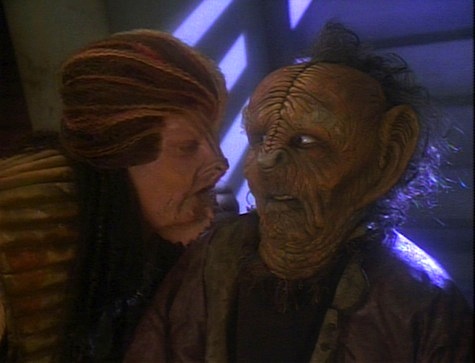
Make it So: “So you can imagine how much this means to me.” I have to admit to absolutely loving this two-parter, mainly because it’s such a delightful little throwback. It’s a pure action piece that wouldn’t have been out of place on my television set on a Tuesday night in 1979. It’s got phaser fights, space battles, deceptions, double crosses, poor disguises, interrogations held at gunpoint and/or by throwing somebody into a wall, lots of aliens, the sneeringest of sneering bad guys, a mysterious second in command, and Picard backhanding Riker across the jaw and then kicking him in the ribs. I ask you, what’s not to like?
And yet, it’s still very much a TNG episode. Data gets to work on his command routine, which is more polished and sure than it was in “Redemption II,” and yet very much rooted in the character’s hyper-rationalism. Riker gets to be the man of action he was originally pitched as, leading away teams and being the charismatic guy. Both Picard and Riker work hard—going so far as to risk their cover more than once—to ensure that no lives are lost. (After episodes like “Where Silence Has Lease” and “Starship Mine” and “Suspicions” and “Descent, Part II,” where the characters are a little too cavalier about causing loss of life, this is refreshing.)
Most of all, though, this episode follows the TNG credo that Jean-Luc Picard is smarter than you. He throws himself completely into the part, immediately changing tactics in such a way that will allow Riker to be brought in on his plan, furthering his agenda while creating a convincing persona as Galen, even submitting himself to the incredible drudgework of appraising the artifacts one by one.
It helps that most of the acting is top-notch. Besides excellent turns by Sir Patrick Stewart (playing Galen with swagger and super obnoxiousness) and Jonathan Frakes (who gets a lot of mileage out of his WTF face, from the revelation that Worf used his nonexistent pregnant sister to get info to several reactions to Picard on the mercenary ship), there are some fine guest turns. Cameron Thor plays Narik very well, constantly whining and on the defensive, knowing he’s only marginally competent but refusing to be blamed for everything that goes wrong, even though he knows it’s probably his fault. Robin Curtis gives a performance that is light-years ahead of her robotic turn as Saavik. And if you want an unrepentant bad guy that you unreservedly hate, it’s hard to go wrong casting Richard Lynch and his Brooklyn snarl.
I wouldn’t want this every week, but, as with the similar “Power Play,” it’s a fun little romp that’s a nice change of pace.
Warp factor rating: 6
Keith R.A. DeCandido doesn’t just write genre stuff, as when he’s done uploading this rewatch, he has to go back to co-editing (with Cecilia Tan) the 2013 Yankees Annual for Lindy’s Sports, which will be out in March.










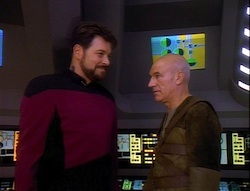
WHy do I feel like this would have been a typical Galaxy Quest TV episode in some alternate universe?
you forgot that Julie Caitlien Brown played Na’toth in B5 before this or concurrently with how long the season for B5 was
A fun episode with great acting by Frakes and Stewart, but two points of credulity.. make that 2.5…
First- the captain of the Federation flagship, who has access to top secret classified information gets to wander into non-Federation space and visit space pirate infested cantina’s, where he is essentially on his own and can be kidnapped? What if he’s recognized and captured by the Romulans or Cardassians? It seems that someone with high level knowledge of ships systems, tactical deployments, etc would have some restrictions on where he can take his vacations.
Second, after his Captain is kidnapped, Acting Captain Riker puts himself in a situation where he too can be kidnapped. Obviously he didn’t learn anything from “Descent Part 1” where everyone got captued… They spent so much time in the first few seasons establishing that the Captain can’t put himself in harms way unnecessarily, and then spend the last few seasons tossing it out the airlock. Yes, I know some of this was behind the scenes bitching by Patrick Stewart that he essentially did nothing but sit in a chair and take reports, but why is it Riker leading the away team on Barradas III- shouldn’t it be Data leading it?
Third, Jean Luc Picard shouldn’t be that hard to identify. Even if you don’t recognize him as the captain of the Federation Flagship, facial recognition is a modern day reality- by the 24th Century it should be even easier. The fact that he can freely wander amongst the wrteched hive of scum and villainy without being cautious seems a bit wierd to me. Without any sort of facial alteration he gets to just show up and start asking questions of the underground?
Other than those minor points, I really liked this episode. Like DS9 shows, there is no reason that the galaxy, especially outside of Federation space should be filled with goodness and light as Roddenberry seemed to imagine it. Space Pirates, smugglers, and other criminal elements should be fairly common, and I’d have to imagine a certain percentage of Starfleet’s sector fleets probably would be involved with policing the space lanes to prevent it. I like seeing the less perfect Star Trek Universe…
With some species, it’s kind of a relief that you never get to see the females…
I have a particular soft spot for the string of episodes starting with this one and going through “Attached.” These were the episodes that were on the first week I actually started watching Star Trek. I was really bored one summer night, and I thought, “Isn’t Star Trek: The Next Generation on? Sometimes that can be good.” I decided that I would look up the description in the paper and if it looked good, I’d watch it. This episode was on, and it sounded good to me. I was pretty hooked by the episode, so of course the next night I had to watch part II. The descriptions for the episodes for the rest of the week also sounded interesting to me, so I watched all that week. After that it was pretty much history. So even though season 7 gets a pretty bad rap, apparently these episodes were interesting enough to me at the time that I got totally hooked on the show.
As for the episode itself on rewatch, I thought that the scene with Riker and Troi at the beginning was pretty good. I tried to imagine the suspense of what it would be like watching it for the first time again, not knowing he was just beamed away to the ship. I’d probably still suspect he was really alive, but I wonder if that scene would have a much bigger emotional impact.
Also, THANK YOU for mentioning the two meters thing! I was actually saving that comment for this rewatch. “About two meters tall” seems to be a common approximation in these shows for a human, but it’s not a very accurate one. On Star Trek in particular, we don’t really see beings or humanoids that go outside that range (even if it were only 1 meter or 3 meters) very often. “About two meters” could be used as an approximation of just about any humanoid we see (though 1.7-1.8 might work better). So it seems that this is just two general of a description, if it fits just about anyone. They really need to use more precise units.
I like the “transporter gun” idea. It’s a pity it was never heard from again. I also liked the glimpse into the history of the Romulan diaspora. The idea that the proto-Romulans settled on multiple worlds and diverged into different civilizations is an interesting one that I wish had been followed up on.
I liked Richard Lynch here; he was a very impressive villain. At the time I saw “Gambit,” I had (mercifully) forgotten that Lynch had played the villain Xaviar in the premiere episode of Galactica 1980, the ill-conceived sequel/spinoff series that only existed so that ABC could try to earn back some of the expense of the original Battlestar Galactica by reusing its sets, props, FX footage, and so forth. When Xaviar returned in a later episode, though, he was played by a pre-Sherlock Holmes Jeremy Brett — inexplicably giving Xaviar a pseudo-German accent (that occasionally veered toward Dracula territory) rather than anything resembling Lynch’s “Brooklyn snarl.” (Lynch had also played an unrelated character in the original BSG’s “The Gun on Ice Planet Zero.”)
ChristopherLBennett, didn’t some of the novels such as Shatner’s trilogy and the Vulcan’s Soul trilogy go into some depth about Romulan offshoots, even giving a close look at one – the Watraii?
I’m fond of this one as well and agree that it belongs with episodes like Power Play and Disaster. It’s not deep, it’s not meaningful, it doesn’t have anything to say about the human condition, but it’s a solid hour’s worth of entertainment. It’s an episode designed to amuse the audience, and it does its job well.
I’m so pleased to see some love for “Gambit.” In all the various official and non-official Star Trek guidebooks, people dump all over this two-parter for being insubstantial and “campy.” Well, sometimes I guess it’s okay to be a little bit campy, because I *love* these episodes. Like another commenter said, this was among the first episodes of TNG I ever saw, so maybe that’s why it has a special place in my heart, but I just think it’s really, really fun. For all the love I have for TNG (and Star Trek across the board), sometimes it takes itself a tad too seriously. You gotta throw in a couple of these episodes from time to time to offset that.
I agree with the consensus; I love the Gambit two-parter because it’s just pure popcorny fun and knows it. Yeah, some of the plotting decisions are thin (in addition to all the captains on the front lines, I always raise an eyebrow at Riker having to persuade Starfleet to investigate the mysterious murder of the captain of their flagship), but it’s all in the service of getting Riker and Picard as space pirates, and there is no bad there. I love the space pirates, I love all the frantically-improvised scheming, I love the entire bar scene (most especially Crusher’s dramatic entrance), and I love that the cliffhanger works because of Riker and Data having absolute faith in each other.
No mention of Richard Lynch’s stunning turn as Noel in Wharwulf? I mean, Werwoof? I mean, Werewolf? Yetiglanchi, baby!
Okay, it’s probably not fair, since he was a hardworking character actor, but I can never see him without thinking of the role in which I first saw him. “What!? It’s fun!”
I love pirate episodes. I knew it was going to be fun as soon as Richard Lynch showed up as the villian. He does Great villians. I did have a problem with both Picard and Riker being captured by the pirates it seemed a little overkill but the bar scene was fun. We should have had more horrible things that happened on shore leave episodes. I believe the current tally is something like Riker kidnapped or captured 4 times and Picard 3 ;Why do we let them off the ship again?
#12: Didn’t the Navy used to make hygeine films with names like “Shore Leave”? If I knew how to edit video, I’d be making a spoof with a mashup of ST clips right now.
I remember Richard Lynch as Morgan Velosi from the Buck Rogers episode “Vegas In Space”.
I had no idea this two-parter got so many references in the tie-in literature! I’ve never been crazy about it (as a “fun” story, it just isn’t as fun as the others mentioned), so I guess I didn’t pay attention to that.
I don’t think of Sabrina LeBoeuf’s appearance here as a Robert Knepper Moment, since she had already become known for The Cosby Show by the time this was made.
There’s another reason Jean-Luc Picard should be too well-known to escape detection while undercover–he tried to assimilate Earth when he was Locutus of Borg, destroying a chunk of Starfleet in the process. Anyone who’d seen that “on the news,” if nothing else, should know who he is.
#14: “Vegas in Space” was actually the name of an episode? Man, that was a great show.
Edgar: Robert Knepper moments are for people whom I had forgotten were on a TNG episode after 20 years. Sometimes it’s because I didn’t know who they were then, sometimes it’s because I forgot they had this appearance. LeBoeuf is the latter.
Also? It’s my rewatch. I get to decide Robert Knepper moments. Dammit. *pouty face*
—Keith R.A. DeCandido
All this time I’ve figured that Robert Knepper moments were for people who weren’t yet famous when they did TNG but became so later.
I thought Robert Knepper moments were for times when you had an epiphany like, “Hey, it’s that person from that other show!” such as when Eric Avari showed up as a Klingon.
All this time I thought Robert Knepper moments were when a good actor sort of stunk on TNG!
Data’s finger steeple tap thing was awesome.
Its funny Picard mentioning the events of Chain of Command, and in Gambit we get someone inflicting pain on others by remote control, Picard/Galen acting as an interrogator and back handing someone, all of which happened in COC. In Pt2 we even get a Captain having to contend with a disobedient First Officer.
I just wanted to say that Deana’s rant at the beginning of this episode at Will infuriated me and destroyed any sympathy I had remaining for her character. So she, a ship’s counselor, is going to chastise this guy because she doesn’t approve of the way he wants to grieve? That’s shallow and disrespectful for anyone, but someone who is a counselor and (presumably) a psychologist? It’s totally inexcusable. “No, you have to grieve how I want you to grieve? Do you think you have a monopoly on pain? I’m in pain, too!”
And? Her pain has literally nothing to do with the manner in which Will wants to grieve (personally and angrily, skipping the funeral). She of all people should have been able to respect that. Deana has never been a particularly good character, but this is as bad as her behavior in whatever episode that was where she lost her empathic abilities.
Aria: Yes, and no. Troi was right in one regard — Riker had responsibilities as the CO of the ship to lead a memorial service. Riker’s grief was irrelevant there, or, at the very least, subservient to his role as the new leader of the vessel. Having said that, her response could have afforded to be a bit more professional, yes….
—Keith R.A. DeCandido
I like the relative mundanity of the episode; it’s just about people stealing stuff and wanting to get rich. Not every episode should be about wonder and discovery.
Nice small touch that the alien bartender described Picard as having a “smooth head” rather than bald. Maybe his race can’t go bald.
As for the Riker/Troi scene, don’t you people know that shouting is exactly equal to drama?
I think what Data’s doing in the above photo isn’t entirely getting into Captain mode; he has a mystery to solve, after all. Sherlock Holmes tents his fingers like that all the time when working on a case. Data has probably started his Holmes program in the background to help solve this apparent murder and kidnapping.
@22/Aria DiMezzo: I had the exact opposite reaction. I was mad at Riker because he considered his personal grief more important than his responsibilities towards his crew. Troi was close to Picard too, but she acted much more professionally. She talked to the crew and arranged the memorial service while he sat in his quarters. He didn’t thank her, he didn’t even ask how the crew was doing – she had to tell him. She was right to shout at him.
I would have liked the scene much better if he had asked her about the crew, then mentioned the memorial service himself, but told her that he felt that he couldn’t do it, and asked for help. As it is, he comes across as a bad captain.
@25/Lisa Conner: My daughter’s comment was that Data would make a perfect villain, because he sits in a big chair with his fingertips against each other, and he has a cat.
When Crusher said in the cantina scene that she was “picking up some Starfleet fibre traces”, I assumed that Picard had been in uniform, but later he told Riker that he had convinced his capturers that he was a smuggler, so probably not. Was she picking up traces of his underwear?
Troi’s being angry at Will worked super well for me. In extreme times of loss, people lose their professionalism… and in this case, we have Troi mad at Will for not being there for her, Troi having recently turned away from a life with Tom. Will who is now her captain, the thing he left her to do, and never actually did. At moments like these, we wish we had stayed in that less-than-ideal relationship, because we would have someone to cry with.
She is taking all that out on him and I thought it was really human. The oft referenced “The Body” episode of Buffy shows people in all their irrational grief and this reminded me of that. This is the kind of effed up conversation the Enterprise should have had more of, when people are thought dead.
That said, it seems odd to me that STTNG had a habit of doing similar themes twice in a row. We just had LaForge lose his mom and think she was alive; now we have Picard, thought lost, turning out alive. In both cases we see how irrationally people act, though for all the lightheartedness of this ep, it communicated that better.
today’s minimalist search terms: “rewtch gmbit”
“I have to admit to absolutely loving this two-parter, mainly because it’s such a delightful little throwback. […] I ask you, what’s not to like?”
I couldn’t agree more. This two-parter is among my favourite episodes and my usual piece of evidence apart from “The Pegasus” and “Lower Decks” to prove that Season 7 was not nearly as bad as many people claim. But why on earth a rating of 6? It should have been 9. (I know, the least important part…)
I had the exact opposite reaction to Troi’s anger. I thought it was fully justified. I’ve had family members pass away and in one circumstance one of my relatives felt she had a monopoly on the loss and wanted to make all the decisions regarding the funeral (including stopping other people from eulogizing and sharing pictures at the funeral). I was furious at her because the funeral is for all friends and family who knew the deceased, not just his child.
@ThomasE: I’ve said for over 20 years now that seasons 6 and 7 are the best 2 seasons of TNG. The acting is the best in these two seasons and the actors seem like they have fully matured and developed into their roles. I think the turning point was the “Chain of Command” 2-parter. At that point, it felt like the series really became taken more seriously. And the characters became more developed and used more fully with Crusher and Troi both being seen in command more frequently and Data being developed to express emotions (although temporarily).
Anybody else get the feeling Picard quite enjoys being on his own and exploring wretched hives of scum and villainy?
@31 – Picard was a maverick and a cad when he was young, so even though he’s smoothed out those rough edges and lives a life of restrained professionalism, he probably still has that adventurous swashbuckling kid somewhere inside him.
@29 I agree completely. Riker’s grief was palpable, but in the moment he seemed to forget that there were a thousand other people on the ship who were grieving Picard as well, and he was, as acting Captain, the only one with the luxury of retreating into a shell and acting all pouty and self-righteous. Everyone else had to go about the daily business of arranging memorials and keeping the ship going, while he brooded for justice. Deanna was right to dress him down, and by the way, it appears to have worked.
Ok, so I think this episode stumbles right at the start by asking you to believe Picard is dead, and accept the subsequent performances based on that, without anything to anchor that idea. So, the Riker/Troi argument falls a little flat because you have to be convinced they’re truly sure he’s dead, but you know he’s not (really, they’re going to kill off the nucleolus of the whole series?), and they’re going off some mercenary saying “he was vaporized.” I think it would have been more interesting if the drama was more based off argument as to whether he was really dead. That said, the rest of the episode, I would have to agree, is a fun romp. Lot’s of action, brinkmanship, and well-played back-and-forth between Frakes and Stewart. Ultimately, they pushed the envelope too far in terms of believably, and that detracts, but I’ll still give it an 8.
I’m sure I recognized Sabrina LeBeauf when the episode first aired, so it’s not a Robert Knepper Moment for me exactly what I thought a Robert Knepper Moment was, but I had zero memory of her popping up at ops.
@3. MikeKelm — We do see Data making the first-officer argument you reference and Riker basically replying, “Yeah. I’m going down anyway.”
@26. JanaJansen, whose contributions to these rewatch conversations are among those I’ve most enjoyed — Maybe the “Starfleet fibre traces” were simply due to Picard having created his civilian clothes via Federation-issue replicator.